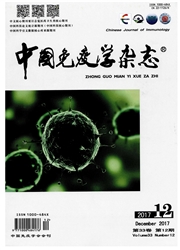

 中文摘要:
中文摘要:
目的:研究BALB/c小鼠细粒棘球蚴感染早期对NK细胞的影响。方法:用细粒棘球蚴感染BALB/c小鼠后,分别于1、3、5、7、9、12天处死小鼠,取其脾细胞,用流式细胞仪分析NK细胞的活性受体NKG2D的表达,LDH法检测脾细胞的杀伤活性。结果:①在细粒棘球蚴感染早期,小鼠NK细胞对Yac-1细胞的裂解率(NK细胞杀伤活性)与对照组比较差异均有统计学意义(P〈0.05);随着感染时间的延迟感染组小鼠NK细胞的杀伤活性呈下降的趋势,各组之间均有统计学意义。②随着时间的延长NK细胞的活性受体NKG2D的表达量呈下降的趋势,与对照组比较,感染后1、3、9、12天NKG2D的表达量差异都有统计学意义(P〈0.05)。③随着时间的延长NK细胞数量呈下降的趋势,与感染前比较,感染后第1、3、9、12天NK数量差异都有统计学意义(P〈0.05)。④细粒棘球蚴早期,感染小鼠NK细胞的杀伤活性与其活性受体NKG2D的表达呈正相关,相关系数r=0.679。结论:小鼠感染细粒棘球蚴后,可降低NK细胞数量、NK细胞活性受体NKG2D的表达和NK细胞的杀伤活性;小鼠NK细胞的杀伤活性与其活性受体NKG2D的表达呈正相关;包虫免疫逃逸可能是通过降低NK活性受体,降低NK细胞的杀伤活性来实现。
 英文摘要:
英文摘要:
Objective: To observe the changes of NK cells in the early stages of Echinococcus granulosus infection in mice.Methods: BALB /c mice were infected with Echinococcus granulosus,and spleen cells were collected at days 1,3,5,7,9 and 12. The expression level of NKG2D receptor on NK cells was analyzed by flow cytometry and the cytotoxic activity of spleen cells was assayed by LDH. Results: ① In the early stages of Echinococcus granulosus infection in BALB / c mice,the differences of NK cells specific lysis Yac-1 cells were statistically significant compared with control groups( P 0. 05); there was a downward trend in the cytotoxic activity of NK cells with the extension of infection with Echinococcus granulosus,the difference was statistically significant between the groups. ②The expression of NKG2D receptor on NK cells exhibited a downward trend with time delays. The differences in the expression of NKG2D were statistically significant compared with control group at 1,3,9 and 12 days after infection( P 0. 05). ③The number of NK cells exhibited a downward trend with time delays. The differences in the number of NK cells were statistically significant compared with control group at 1,3,9 and 12 days after infection( P 0. 05). ④In the early stages of Echinococcus granulosus infection in BALB / c mice,The expression NKG2D receptor were positively correlated with NK cells cytotoxic,the correlation coefficient was 0. 679. Conclusion: The expression of NKG2D receptor,the number of NK cells and cytotoxic activity of NK cells were reduced in mice infected with Echinococcus granulosus. The expression of NKG2D receptor were positively correlated with NK cells cytotoxic in mice infected with Echinococcus granulosus. The immune invasion of Hydatid may be realized through reducing the activity of NK receptors.
 同期刊论文项目
同期刊论文项目
 同项目期刊论文
同项目期刊论文
 期刊信息
期刊信息
